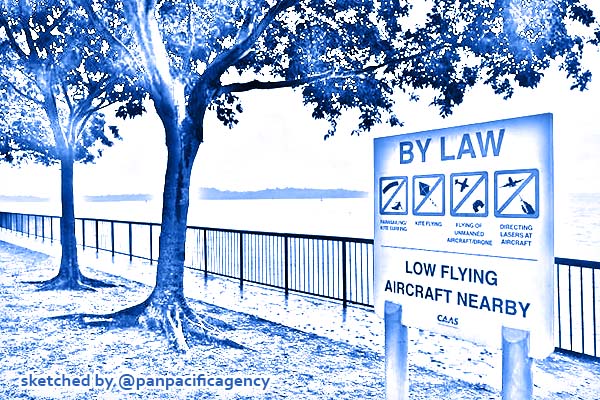Singapore’s panel set to propose drone registration after 2 recent drone incursions at Changi Airport

A sign at Changi Beach warning against the flying of drones and other activities that would affect flights at nearby Changi Airport. Public and industry feedback will be sought before the Unmanned Aircraft Systems Advisory Panel makes its recommendations to the Government. ST PHOTO: NG SOR LUAN. Sketched by the Pan Pacific Agency.
SINGAPORE, Jul 2, 2019, The Straits Times. A panel looking into unmanned aircraft operations is likely to propose mandatory registration for drones above a certain weight and stiffer penalties for those who flout flying rules, reported the Singapore Law Watch.
There will also be emphasis on training and education, said former Republic of Singapore Air Force (RSAF) pilot Timothy de Souza, who heads the 12-member Unmanned Aircraft Systems Advisory Panel that was set up in May.
The work has taken on new urgency after two recent drone incursions at Changi Airport – on June 18 and June 24 – that led to at least seven flights being diverted and more than 50 delayed.
The culprit – or culprits – have reportedly not been caught yet.
Mr de Souza told The Straits Times, in his first media interview, that the initial plan was for the team to submit its recommendations to the Government next year.
“We are now looking to bring this forward by three to four months, and get the work done by the end of this year,” he said.
“There is consensus that we need to respond faster (in the light of the recent incursions).
“I do not need to impress upon anyone the kind of damage to our reputation and economy that such incidents cause,” said the 72-year-old, who spent about 30 years in the RSAF.
One flight diversion can cost an airline as much as $150,000, experts say.
Safety is also a big concern, Mr de Souza stressed, adding that the consequences can be disastrous if a drone hits an aircraft or enters its engines.
While nobody can guarantee that trouble-makers will never strike again, the panel hopes that new rules and regulations will raise awareness and send a strong signal that errant actions will not be tolerated.
This is why stiffer punishment is necessary, Mr de Souza said.
There is currently a ban in Singapore on flying drones within 5km of airports or military airbases, or at altitudes above 61m, without a permit. Those who flout the rules can be fined up to $20,000 and jailed for up to a year.
Mr de Souza said: “You think this is reasonable, if you disrupt our airport twice? If you ask the panel, the answer is no.”
Still, public and industry feedback will be sought on this and other matters before the panel makes its recommendations.
Registration, most likely at the point of purchase, will be the first important step, he said.
How it will be done, whether it will be required for all drones or just those above a stipulated weight, and other details will need to be worked out.
He said: “Registration will give us the ability to reach out to users so we can provide proper training and also educate them about where they can and cannot fly their drones.”
In some countries like the United States and China, this is already being done. Australia and Britain are also planning similar measures.
Mr de Souza said: “We must take the long-term view because unmanned aircraft systems are here to stay, and we will see more and more of them being used for commercial and other purposes.”
In June 2015, the Civil Aviation Authority of Singapore (CAAS) started tracking the use of unmanned systems.
For the 2018/2019 financial year, it approved 539 operator permits, which are valid for up to a year, and issued 2,452 activity permits, which are for a single activity or a block of repeated activities to be carried out at a specific area of operation.
Even as the panel continues its work, the CAAS is looking to beef up its anti-drone capabilities.